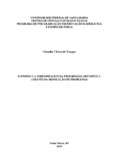| dc.creator | Vargas, Claudia Vieira de | |
| dc.date.accessioned | 2019-11-20T14:44:01Z | |
| dc.date.available | 2019-11-20T14:44:01Z | |
| dc.date.issued | 2019-06-27 | |
| dc.identifier.uri | http://repositorio.ufsm.br/handle/1/18987 | |
| dc.description.abstract | The motivation for the development of this research stems from concerns and observations about the teaching and learning of arithmetic progression. Usually in schools, the approach to this content does not favor understanding, because use and memorization of formulas are emphasized. On the other hand, there are studies indicating good results obtained with the use of problem solving in mathematics education. The objective of this research is to investigate how the methodology of teaching-learning-evaluation of Mathematics through problem-solving, contributes to the teaching on arithmetic progression in a 1st year high school class. São José Institute was the school where this work was developed and is the school where researcher works as a teacher. The data collect was developed in eight meetings and used the Methodology of Teaching-Learning-Assessment of Mathematics as a theoretical support, through the Problem Solving proposed by Allevato and Onuchic (2014). Problems were planned and applied that would allow the construction and formalization of such content. The research had a qualitative approach, using three instruments in the data collection: questionnaire, observation and documentary analysis. The documents reviewed were, especially the resolutions produced by students during the meetings. And the records of the observations were as follows: field diary, audio recordings, and photographs. With the analysis and discussion of the collected data we noticed that the problems developed inserted the students in the process of constructing the concepts, making them producers of own knowledge, because the strategies used in the resolution of the problems led to the reflection, contributing to the recognition, systematization and formalization of mathematical concepts. Thus, the use of problem solving as a teaching methodology, favored from less abstract manner to the approach of the student with the content studied. This methodology has become an important strategy that generated great interest and motivation on the part of students, developing a favorable environment for the learning of Mathematics. We hope, with this research, to contribute with suggestions and strategies of teaching capable of breaking with the memorization of formulas, which little contributes to the formation of our students, in particular, in the teaching of Arithmetic Progression. | eng |
| dc.language | por | por |
| dc.publisher | Universidade Federal de Santa Maria | por |
| dc.rights | Attribution-NonCommercial-NoDerivatives 4.0 International | * |
| dc.rights.uri | http://creativecommons.org/licenses/by-nc-nd/4.0/ | * |
| dc.subject | Progressão aritmética | por |
| dc.subject | Resolução de problemas | por |
| dc.subject | Ensino e aprendizagem de matemática | por |
| dc.subject | Arithmetic progression | eng |
| dc.subject | Problem solving | eng |
| dc.subject | Teaching and learning of mathematics | eng |
| dc.title | O ensino e a aprendizagem da progressão aritmética através da resolução de problemas | por |
| dc.title.alternative | Teaching and learning arithmetic progression through problem solving | eng |
| dc.type | Dissertação | por |
| dc.description.resumo | A motivação para o desenvolvimento desta pesquisa resulta de inquietações e observações a respeito do ensino e aprendizagem da progressão aritmética. Nas escolas, em geral, a abordagem desse conteúdo não favorece a compreensão, sendo enfatizadas a utilização e memorização de fórmulas. Por outro lado, existem estudos que apontam bons resultados obtidos com a utilização da resolução de problemas no ensino de matemática. O objetivo desta pesquisa é investigar como a Metodologia de Ensino-Aprendizagem-Avaliação de Matemática através da Resolução de Problemas, contribui para o trabalho acerca da progressão aritmética em uma turma de 1º ano do Ensino Médio. A escola em que se desenvolveu este trabalho foi o Instituto São José, na cidade de Santa Maria, RS, na qual, a pesquisadora atua como professora. A coleta de dados, desenvolvida em oito encontros, utilizou como aporte teórico a Metodologia de Ensino-Aprendizagem-Avaliação de Matemática através da Resolução de Problemas proposta por Allevato e Onuchic (2014). Foram planejados e aplicados problemas que possibilitassem a construção e formalização de tal conteúdo. A pesquisa teve uma abordagem qualitativa, usando três instrumentos na coleta dos dados, a saber: o questionário, a observação e a análise documental. Os documentos analisados consistiram, especialmente, das resoluções produzidas pelos alunos durante os encontros. E os registros das observações se deram das seguintes maneiras: diário de campo, gravações em áudio e fotografias. Com a análise e discussão dos dados coletados notamos que os problemas desenvolvidos permitiram a inserção do aluno no processo de construção dos conceitos, tornando-os produtores do próprio conhecimento, pois as estratégias utilizadas na resolução dos problemas propiciaram a reflexão, contribuindo para o reconhecimento, sistematização e a formalização dos conceitos matemáticos. Assim, a utilização da resolução de problemas como metodologia de ensino, favoreceu para a aproximação do aluno com o conteúdo estudado de maneira menos abstrata. Esta metodologia se tornou uma importante estratégia que gerou maior interesse e motivação por parte dos educandos, desenvolvendo um ambiente favorável à aprendizagem de Matemática. Esperamos, com a pesquisa, contribuir com sugestões e estratégias de ensino capazes de romper com a memorização de fórmulas, que pouco contribui para a formação de nossos alunos, em particular, no ensino da Progressão Aritmética. | por |
| dc.contributor.advisor1 | Noguti, Fabiane Cristina Höpner | |
| dc.contributor.advisor1Lattes | http://lattes.cnpq.br/1247690905207985 | por |
| dc.contributor.referee1 | Allevato, Norma Suely Gomes | |
| dc.contributor.referee1Lattes | http://lattes.cnpq.br/9614794595123496 | por |
| dc.contributor.referee2 | Mathias, Carmen Vieira | |
| dc.contributor.referee2Lattes | http://lattes.cnpq.br/0112509701698645 | por |
| dc.creator.Lattes | http://lattes.cnpq.br/2720644204642263 | por |
| dc.publisher.country | Brasil | por |
| dc.publisher.department | Educação | por |
| dc.publisher.initials | UFSM | por |
| dc.publisher.program | Programa de Pós-Graduação em Educação Matemática e Ensino de Física | por |
| dc.subject.cnpq | CNPQ::CIENCIAS HUMANAS::EDUCACAO | por |
| dc.publisher.unidade | Centro de Ciências Naturais e Exatas | por |



